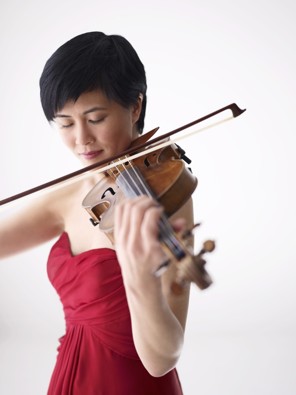The Washington Post
By Stephen Brookes
May 24, 2013
original
link
At Atlas, Jennifer Koh offers an unforgettable whirlwind of sound

(Jurgen Frank)
If the Library of Congress’s Coolidge Auditorium is the revered dowager of Washington’s chamber music scene, then the Atlas Performing Arts Center — in the heart of the hipster H Street corridor — must be its sexy granddaughter with the tattoos. Maybe that’s why it was picked for Thursday night’s edgy, high-intensity program by violinist Jennifer Koh, the second in this week’s Library-sponsored concerts featuring the music of West Coast composer John Adams.
When Koh was in town a couple of months ago, she brought her near-flawless technique to an orchestral performance with players from the Curtis Institute. But Thursday’s concert (with Reiko Uchida at the piano) was a far more intimate encounter, built around particularly intense — and often white-hot — works from the past hundred years. Koh played with eloquent intensity all evening, opening boldly with Leos Janacek’s “Sonata” — a work written during World War I and so steeped in bleak foreboding that even its tender ballade seethes with anguish. Koh turned in a detailed, often severe reading with a delicately brutal edge, and seemed to set in motion a powerful momentum — both musical and emotional — that carried throughout the evening.
Written in 2002 for solo violin, “Lachen verlernt” (“Laughing unlearnt”) by Esa-Pekka Salonen is a brilliant tour de force, building from a tranquil melody to an exhilarating whirlwind of sound, and Koh turned in a bravura performance, equal parts intelligence, fiery virtuosity and mischievous smiles. Schubert’s charming Sonata in A, D. 574, Op. 162 followed as a respite (think dappled sunlight and frolicking little lambs), and a chance for Koh to marshal her forces for Bela Bartok’s 1944 Sonata for Solo Violin — another wartime piece.
Bartok was wasting away from illness when he wrote this work, but you’d never know it from the raw intensity of the thing. It’s a masterpiece of counterpoint — at its heart is a crazily difficult fugue full of rapid-fire leaps of register, double- and triple-stops, and subtle shifts of emphasis — but more than that it’s a cri de coeur of almost overwhelming emotional depth. And from both a technical standpoint (the range of violin colors she commands is astounding) and an interpretive one, Koh played it with absolute commitment — an unforgettable performance full of fire and penetrating insight.
But the most purely enjoyable work on the program may have been Adams’s “Road Movies,” a work that the composer himself introduced as a celebration of “that great American institution of driving.” And, yes — we do love hurtling down the highway with the top down and the wind in our hair, scattering pedestrians as we fly into the future, and “Road” beautifully captures that heady excitement of freedom and infinite possibility. With Uchida laying down a groove on the piano, Koh surfed rambunctiously over the driving rhythms — an all-too-short ride in a very fast machine.
Copyright ©2013 The Washington Post
© Jennifer Koh, All Rights Reserved. Photography by Juergen Frank. Site by ycArt design studio